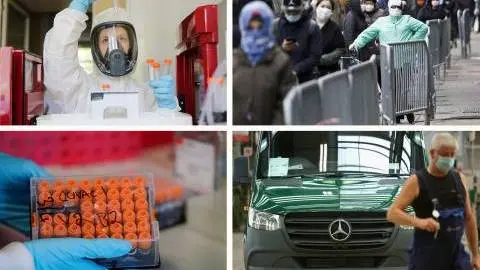Eurozone: The rebound continues…for now
The eurozone is still on track to see a very strong third-quarter growth figure. However, recent indicators signal some deceleration. Inflation is undershooting expectations, paving the way for an extension to the Pandemic Emergency Purchase Programme
Beyond the third quarter
We’ve pointed it out already many times: when production rises from nearly nothing to something, you’ve got strong growth. That is what is happening now in the third quarter, as the easing of the lockdown measures and the reopening of businesses creates this effect. The fourth consecutive strong increase of the European Commission’s economic sentiment indicator in August clearly points towards robust third-quarter growth, potentially double-digit growth figures.
When production rises from nearly nothing to something, you’ve got strong growth
At the same time, you shouldn’t be blinded by the strong 3Q figures because we believe things will become a bit more difficult after the initial strong rebound. Some indicators actually already signal a deceleration in the growth pace. As such the flash composite PMI fell in August and also the Eurocoin indicator lost further momentum last month. Of course, a flareup in the number of Covid-19 infections over the summer has made it very clear that as long as there is no effective vaccine, growth will be handicapped.
Spain seems to be the unfortunate example of this phenomenon, as the tourist season has been a major disappointment in the wake of a second Covid-19 wave. But France, too, has seen any improvement lose steam recently. In both countries, the manufacturing PMI actually fell below the 50 point threshold in August.
Second round effects
There is also the fear of negative second-round effects once the current recession starts to be reflected in a swelling number of unemployed (the unemployment rate already rose to 7.9% in July). Fortunately, most countries have decided to prolong the temporary unemployment schemes – in Germany even to 24 months – to limit the negative shock to disposable income.
But even then, we cannot exclude higher precautionary savings dampening consumption. We stand by our 8.0% GDP contraction this year and pencil in a 4.8% rebound in 2021, albeit on the assumption that a vaccine will be widely available in the first half of next year. So there is clearly a downward risk to this forecast.
Unemployment fears

Inflation jitters
July and August inflation figures were distorted by the VAT cut in Germany and a fragmented sales season. By just taking the average of both months it seems clear that underlying inflation remains anchored around 1%. To be sure, if the German VAT cut is reversed in January next year as planned - though this is not a done deal yet in an election year - inflation would be pushed upwards. But even then eurozone inflation is unlikely to top 1.5%.
Moreover, the strong euro is likely to temper any upward price pressure. Indeed, in the August survey from the European Commission, selling price expectations already softened somewhat both in industry and services, a potential consequence of the loss of competitiveness on international markets. According to ECB research, a 10% change in the euro exchange rate (which we are close to), results in a 0.4 percentage point change in inflation.
Inflation expectations anchored at 1%?

ECB cannot lean back
With financial market tensions having abated on the back of the forceful actions of central banks worldwide, the European Central Bank is becoming a bit more relaxed. This led several members of the governing council to suggest that the amount available in the PEPP should not necessarily be spent entirely.
Some PEPP extension is still possible
However, Chief Economist Philip Lane made it clear in his Jackson Hole address that “ an intense temporary phase of additional monetary accommodation” was necessary to get inflation back on track.
With the euro strengthening, this task will be further complicated. Therefore we believe not only that the PEPP envelope will be spent entirely, but on top of that, some extension is still possible. However, a decision on this matter will most probably have to wait at least until December.
This publication has been prepared by ING solely for information purposes irrespective of a particular user's means, financial situation or investment objectives. The information does not constitute investment recommendation, and nor is it investment, legal or tax advice or an offer or solicitation to purchase or sell any financial instrument. Read more
Download
Download article
3 September 2020
Covid-19: The virus, the vaccine and what next for the global economy? This bundle contains 10 Articles